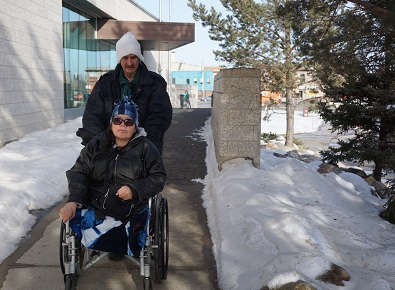Marlene Bird and her partner Patrick Lavallee outside court on March 15. Photo by Chelsea Laskowski.
Leslie Black’s defence lawyer called an expert psychologist to the stand in Prince Albert court on Monday to talk about Black’s risk to reoffend after his June 2014 attack on Marlene Bird.
Terry Nicholaichuk was the first to speak in the second week of the hearing, in which the Crown prosecutor is seeking to have Black labeled as a dangerous offender.
There are different types of dangerous offender statuses and if the Judge S.D. Loewen chooses the most serious one for Black the “odds are overwhelming that he will die in prison,” Nicholaichuk said.
On the stand, Nicholaichuk said he’s seen the pictures of Bird after Leslie Black tried to kill her and calls the results of Bird being beaten, set on fire and doused with an accelerant as “brutal.”
Nicholaichuk had previously independently assessed Black over the course of two days at the Regina Correctional Centre for a number of things, including his risk to reoffend, academic abilities, and learning disabilities.
He noted that in his talks with Black he did “admit to using a light to set fire to” Bird’s clothing and recalled getting candy afterwards. However, he did not recall getting an accelerant or gasoline, which surgeons said was present when Bird was brought to hospital. Nicholaichuk said because of this, Black was surprised about the extent of injuries she suffered but “certainly does feel bad” about what he did.
He said it’s hard to know how that void in Black’s memory will affect managing his risk to reoffend in a correctional environment.
He did say Black has a limited pattern of violent behavior prior to the offence against Bird, and that is a point in his favour as far as his risk to reoffend. To defend that, Nicholaichuk pointed to a study of thousands of offenders who committed a single serious act of violence, which found no connection between the degree of harm caused and the risk in the community. Previously on the stand, court-ordered psychiatrist Dr. Shabehram Lohrasbe struggled to relate this case to Black’s because it was about people who were in spousal relationships while Black had only met Bird the night of her attempted murder.
He added there are a lot of other obstacles for Black: he has “no close supportive relationships at all,” learning disabilities, “a massive addiction problem” that’s never been addressed, and limited employment history. Black’s father Solomon, a Mistawasis man who MBC interviewed in November of 2015, died in June of 2016.
Nicholaichuk also said Black suffers nightmares, flashbacks, depression and social isolation, which are all symptoms of post-traumatic stress disorder. Previously at this hearing, court heard Black witnessed his mother’s boyfriend stab her to death on his ninth birthday.
Defence questioned Nicholaichuk about Lohrasbe’s assessment that Black has a personality trait called “Alexithymia,” which is essentially a numbing of emotions.
Nicholaichuk said that trait is not an officially recognized treatable illness in psychology, however PTSD is.
He also said Black has a slow processing speed, which means it takes him significant time to provide responses while communicating with others.
“The question is, does he not experience emotion or does he” just not know how to express it? Nicholaichuk asked.
Once sentenced, “there is reason to believe Black is going to be segregated” if he stays in a penitentiary in the prairie region, Nicholaichuk said. Previously at the hearing, court heard that Black had been attacked by other prisoners while being held at the Prince Albert Correctional Centre before being transferred to Regina.
Nicholaichuk said it’s best for Black to be transferred out of the prairie region because there is no programming in segregation.
He said to manage the risk to reoffend, it’s important for Black to form pro-social relationships and receive addictions treatment while incarcerated, and said Black seems ready for the “intensive” treatment he’s likely to receive. He agreed with Lohrasbe’s previous statement that it’s important for treatment to continue once Black is living in the community in order for him find stable housing, form healthy relationships, and avoid falling back into old cycles of addiction.
The Crown prosecutor was set to cross-examine Nicholaichuk Monday afternoon.
